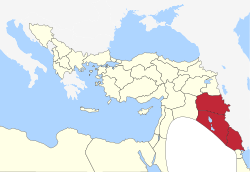Hasan Pasha (Mamluk)
| Mamluk dynasty of Iraq | ||||||||||
|
مماليك العراق Mamālīk al-ʻIrāq |
||||||||||
| Part of the Ottoman Empire | ||||||||||
|
||||||||||
|
Approximate area under Mamluk rule.
|
||||||||||
| Capital | Baghdad | |||||||||
| Languages |
Iraqi Arabic, Ottoman Turkish, Georgian |
|||||||||
| Religion |
Islam (majority), also Christianity, Mandaeism, Judaism |
|||||||||
| Government | Pashalik (autonomous) | |||||||||
| Pasha | ||||||||||
| • | (1704–1723) | Hasan Pasha | ||||||||
| • | (1816–1831) | Dawud Pasha | ||||||||
| History | ||||||||||
| • | Dynasty formed | 1704 | ||||||||
| • | Ottoman reconquest | 1831 | ||||||||
|
||||||||||
| Today part of |
|
|||||||||
The Mamluk dynasty of Iraq (Arabic: مماليك العراق Mamālīk al-ʻIrāq) was a dynasty which ruled over Iraq in the 18th and early 19th centuries.
In the Ottoman Empire, Mamluks were freed slaves who converted to Islam, were trained in a special school, and then assigned to military and administrative duties. Such Mamluks presided over Ottoman Iraq from 1704 to 1831.
The Mamluk ruling elite, composed principally of Georgian officers, succeeded in asserting autonomy from their Ottoman overlords, and restored order and some degree of economic prosperity in the region. The Ottomans overthrew the Mamluk regime in 1831 and gradually imposed their direct rule over Iraq, which would last until World War I, although the Mamluks continued to be a dominant socio-political force in Iraq, as most of the administrative personnel of note in Baghdad were drawn from former Mamluk households, or comprised a cross-section of the notable class in Mamluk times.
The early 18th century was a time of important changes both in Constantinople and in Baghdad. The reign of Sultan Ahmed III (1703–30) was marked by relative political stability in the capital and by extensive reforms—some of them influenced by European models—implemented during the Tulip Period by Grand Vizier İbrahim Pasha.
As in the previous two centuries, Iraq continued to be a battleground between the rival Ottoman Empire and Safavid Empire. The region suffered from frequent inter-clan struggles.
...
Wikipedia

